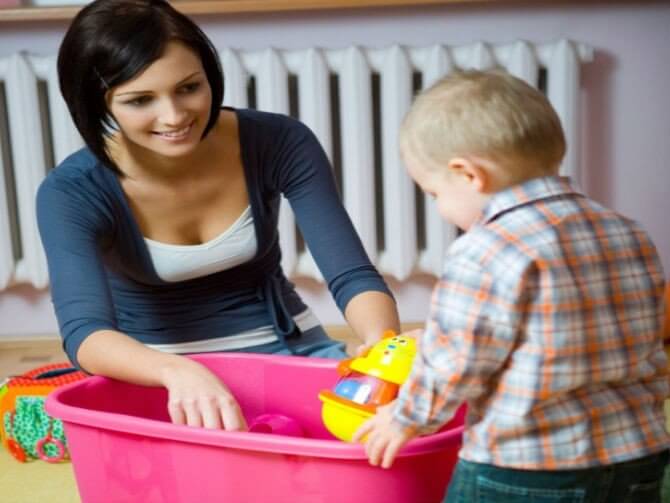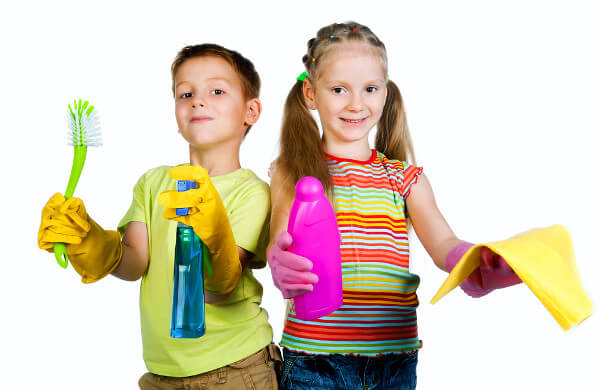Household Chores that Children Can Do, at Every Age

Household chores are a useful tool for teaching children to be responsible and independent.
The home is the first social circle that a child is a part of. This makes it a very conducive environment for putting social norms and values into practice which will instil healthy skills for later in life.
Give Children Responsibilities
Assign small responsibilities to your child that are appropriate for their age. Make it clear that they must accomplish those tasks.
It’s always good to motivate your child and explain to them why they should help out around the house, highlighting the importance of the tasks you assign them. That way, they’ll happily take them on.
This will have many positive effects, boosting their self-esteem and making them feel important and needed in the family.
At the same time, they’ll learn to value work. They’ll realize that household chores aren’t something that get done magically on their own, but that they require effort.
They’ll also learn about the advantages of working together. Every member of your family works together as a “team” so that your home can be a place that is clean, neat and pleasant.
Things to Keep In Mind When Involving Your Child in Household Chores
- Always keep your child’s age and abilities in mind when you choose what chores to ask them to do. You have to hold them responsible for tasks that they can actually do. The idea is for your child to feel encouraged and successful, in addition to them working together with their family. If a very young child is expected to do tasks that they can’t perform, they’ll get frustrated, lose confidence in themselves and won’t want to try again.
- The process of involving your child in household chores requires patience. If something isn’t working well because of their lack of attention span or skill, don’t criticize them or scold them. What you should do is encourage them and show them the correct way to do it. Saying “Look, it’s better to do it this way,” while showing them how to do it, will allow them to get better at it.
What Chores, At What Age?
Choosing chores that are appropriate for the child and their age is a fundamental part of this process. Each task requires certain skills, and your child will be able to perform different chores as they get older.
Below, we’ve provided a guide with some activities that are suitable for different ages:
2 to 3 year-olds can…

- Put their toys away. In the beginning, a good strategy is to accompany this chore with a song. A very well-known song is “Clean up, clean up, everybody do their share.” The same thing goes for children’s books.
- Eat on their own. Choose silverware that they cannot hurt themselves with. It’s best to start with a plastic spoon and then introduce a fork. Although food and drinks will end up on the table, the floor, or their clothes, it’s important to be patient so they can develop this habit.
- Put away their clothes, picking up clothing from the floor of their room or around the house, and carrying it to the closet.
- Watering plants is another task that children will enjoy, and that they’re able to do at this age.
- They can also pick up trash and junk, such as paper or cardboard, and throw it away.
4 to 5 year-olds can…
- Be in charge of their own personal hygiene. They can wash their own body with a sponge (with their mom or dad’s supervision), choose their clothing, and dress themselves.
- Go to the bathroom alone. Surely they’re already out of diapers, and this will encourage them to go to the bathroom alone.
- Set the table. This is a good opportunity to teach them where each utensil goes.
- Feed pets.
- Help wash or dry the dishes.
6 to 9 year-olds can…
- Bathe on their own. They no longer need their mom or dad to be with them when they are bathing.
- Make their bed. Keep their desk clean and prepare their things to take to school.
- Vacuum floors and dust furniture.
- Prepare a simple meal, such as a sandwich.
10 to 12 year-olds can…

- Clean their room and other rooms in the house.
- Walk pets.
- Hang up clothes that have been washed.
- Answer the phone.
Children over 12 can…
- Iron clothes.
- Sew on buttons.
- Tend the garden.
- Help take care of their siblings.
- Do some shopping.
It’s important to avoid associating chores with punishment. “If you don’t do what you’re told, you have to sweep the dining room for the whole week.”
Instead, show them that all of the household chores are important and necessary. The idea is to instil collaboration as a rule for your home and in life.
Household chores are a useful tool for teaching children to be responsible and independent.
The home is the first social circle that a child is a part of. This makes it a very conducive environment for putting social norms and values into practice which will instil healthy skills for later in life.
Give Children Responsibilities
Assign small responsibilities to your child that are appropriate for their age. Make it clear that they must accomplish those tasks.
It’s always good to motivate your child and explain to them why they should help out around the house, highlighting the importance of the tasks you assign them. That way, they’ll happily take them on.
This will have many positive effects, boosting their self-esteem and making them feel important and needed in the family.
At the same time, they’ll learn to value work. They’ll realize that household chores aren’t something that get done magically on their own, but that they require effort.
They’ll also learn about the advantages of working together. Every member of your family works together as a “team” so that your home can be a place that is clean, neat and pleasant.
Things to Keep In Mind When Involving Your Child in Household Chores
- Always keep your child’s age and abilities in mind when you choose what chores to ask them to do. You have to hold them responsible for tasks that they can actually do. The idea is for your child to feel encouraged and successful, in addition to them working together with their family. If a very young child is expected to do tasks that they can’t perform, they’ll get frustrated, lose confidence in themselves and won’t want to try again.
- The process of involving your child in household chores requires patience. If something isn’t working well because of their lack of attention span or skill, don’t criticize them or scold them. What you should do is encourage them and show them the correct way to do it. Saying “Look, it’s better to do it this way,” while showing them how to do it, will allow them to get better at it.
What Chores, At What Age?
Choosing chores that are appropriate for the child and their age is a fundamental part of this process. Each task requires certain skills, and your child will be able to perform different chores as they get older.
Below, we’ve provided a guide with some activities that are suitable for different ages:
2 to 3 year-olds can…

- Put their toys away. In the beginning, a good strategy is to accompany this chore with a song. A very well-known song is “Clean up, clean up, everybody do their share.” The same thing goes for children’s books.
- Eat on their own. Choose silverware that they cannot hurt themselves with. It’s best to start with a plastic spoon and then introduce a fork. Although food and drinks will end up on the table, the floor, or their clothes, it’s important to be patient so they can develop this habit.
- Put away their clothes, picking up clothing from the floor of their room or around the house, and carrying it to the closet.
- Watering plants is another task that children will enjoy, and that they’re able to do at this age.
- They can also pick up trash and junk, such as paper or cardboard, and throw it away.
4 to 5 year-olds can…
- Be in charge of their own personal hygiene. They can wash their own body with a sponge (with their mom or dad’s supervision), choose their clothing, and dress themselves.
- Go to the bathroom alone. Surely they’re already out of diapers, and this will encourage them to go to the bathroom alone.
- Set the table. This is a good opportunity to teach them where each utensil goes.
- Feed pets.
- Help wash or dry the dishes.
6 to 9 year-olds can…
- Bathe on their own. They no longer need their mom or dad to be with them when they are bathing.
- Make their bed. Keep their desk clean and prepare their things to take to school.
- Vacuum floors and dust furniture.
- Prepare a simple meal, such as a sandwich.
10 to 12 year-olds can…

- Clean their room and other rooms in the house.
- Walk pets.
- Hang up clothes that have been washed.
- Answer the phone.
Children over 12 can…
- Iron clothes.
- Sew on buttons.
- Tend the garden.
- Help take care of their siblings.
- Do some shopping.
It’s important to avoid associating chores with punishment. “If you don’t do what you’re told, you have to sweep the dining room for the whole week.”
Instead, show them that all of the household chores are important and necessary. The idea is to instil collaboration as a rule for your home and in life.
All cited sources were thoroughly reviewed by our team to ensure their quality, reliability, currency, and validity. The bibliography of this article was considered reliable and of academic or scientific accuracy.
- Goodnow, J. (1996). Contribuciones a la familia: las ideas de padres e hijos sobre las tareas domésticas. Infancia y Aprendizaje, 19(73), 19-33. https://www.tandfonline.com/doi/abs/10.1174/02103709660560528
- Mendoza, R., Batista-Foguet, J. M., & Rubio, A. (2006). La cooperación de los adolescentes en las tareas domésticas: diferencias de género y características asociadas. Cultura y Educación, 18(3-4), 363-379. https://www.tandfonline.com/doi/abs/10.1174/113564006779172966
- Landwerlin, G. M. (1997). El papel de los niños en la redefinición del trabajo doméstico en la nueva familia urbana española. Revista Internacional de Sociología, 39-56. https://search.proquest.com/openview/032da01b9737a0dabe85cab5742cef2b/1?pq-origsite=gscholar&cbl=1817790
This text is provided for informational purposes only and does not replace consultation with a professional. If in doubt, consult your specialist.








